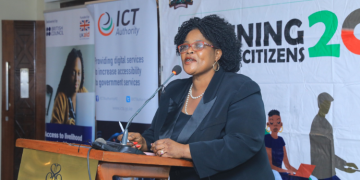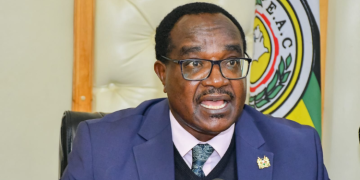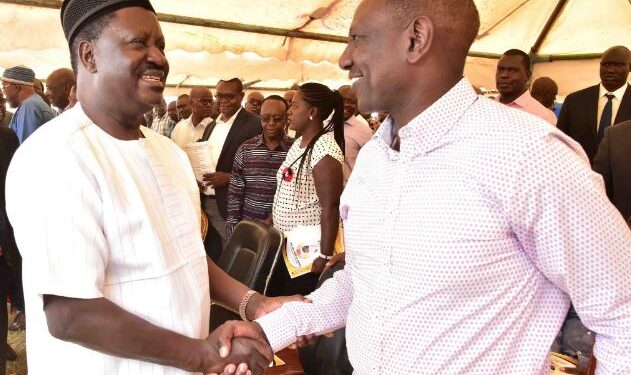My first lecture at the University of Nairobi was in philosophy, where I was introduced to inductive and deductive reasoning. At that time, I did not fully appreciate how these concepts would later become integral to understanding the political landscape of Kenya.
Tom Chatfield (2022) provides a clear explanation of the inductive and deductive reasoning concepts: “There are two ways to use reasoning to support a conclusion: by working through the logical consequences of things you believe to be true, or by considering the likely outcomes of trends or patterns.”
Deductive reasoning involves drawing conclusions based on established facts (e.g., if all puppies need training, any puppy I buy will also need training). Inductive reasoning, on the other hand, involves predicting future outcomes based on observed patterns (e.g., if a friend shakes my hand every time we meet, they are likely to do so again next time).
What Kenya’s New Coalition Means for Development
Kenya’s political landscape is dynamic and multifaceted, with various parties and issues constantly influencing the national discourse. Key topics such as economic challenges, corruption, electoral reforms, and security concerns remain central.
Recent debates on constitutional amendments and international relations continue to shape the country’s trajectory. Understanding and navigating this evolving political environment is crucial for ensuring stability, growth, and equitable development for all Kenyans.

On July 24, President William Ruto made headlines by nominating members from the ODM party for key positions. This move fueled speculation about a potential alliance between his government and the opposition, and that is when we encountered the term ‘broad-based government’ which has been a topic of considerable debate.
What does this term actually mean? A broad-based government is one that includes representatives from a variety of political parties, factions, or interest groups. The aim is to create a more inclusive representation of the diverse interests within society, promoting political stability, unity, and cooperation.
This approach is intended to bridge divides and ensure that different perspectives are considered in the decision-making process.
Also Read: Why President Ruto Needs Raila Odinga More Than Ever
Given this definition, several questions arise: Which interest groups are included in this broad-based government? Which political parties are involved? While understanding the specifics of who is included is important, the broader trajectory of political development is of greater interest.
The formation of a broad-based government can signal a move towards more inclusive governance, but its success depends on how well it can balance the diverse interests and priorities of its members.
Lessons from Past Coalitions
Kenya’s history with coalition governments offers valuable insights into the current political scenario. One of the most significant coalition governments was formed after the highly contentious 2007 elections, which led to widespread violence and a severe political crisis.
The National Accord and Reconciliation Act (2008), resulting from mediation led by former United Nations Secretary-General Kofi Annan, established the Grand Coalition government. This coalition aimed to address the post-election violence and implement necessary reforms to prevent future conflicts. It featured Raila Odinga as Prime Minister, a role that was reintroduced as part of the agreement.
Another important coalition in Kenya’s recent history emerged after the 2017 elections. Led by Uhuru Kenyatta’s The National Alliance (TNA) and William Ruto’s United Republican Party (URP), this Jubilee party sought to unite Kenya’s diverse ethnic groups and create a stable government.
At the same time, the party’s focus was on development and infrastructure, and it aimed to fully implement the new constitution promulgated in 2010. In 2018, a coalition government was formed, in the form of a handshake between Kenyatta and Odinga (opposition leader), which led to the Building Bridges Initiative (BBI). The BBI aimed to address governance issues and foster national unity, becoming a key factor in the lead-up to the 2022 elections.

The Dynamics of Broad-Based Governments
Understanding the dynamics of past coalitions helps in assessing the current broad-based government. Coalition-building in Kenya has been influenced by various factors, including contentions of election results, the electoral system, constitutional limits, and ethno-linguistic dynamics.
What’s more, the 2007/8 Grand Coalition was a response to the urgent need to stabilize the country after a violent and disputed election.
Similarly, the handshake Coalition aimed to consolidate political and ethnic support to promote stability and development.
Broad-based governments are complex and require careful strategic planning. Balancing diverse political ideologies and priorities is essential for crafting policies that are effective and widely supported.
The need for consensus among coalition partners can lead to more comprehensive and inclusive policies that address a range of social and economic needs.
However, this necessity for compromise can also slow decision-making processes and dilute the impact of strategic initiatives.
In the current broad-based government, the motivations behind its formation remain somewhat unclear. Speculation suggests that the political class might be uniting to safeguard their interests, particularly in response to potential generational shifts in politics.
There is concern that emerging political forces might challenge the status quo, leading some politicians to seek protection through this coalition. Without visible and formal coalition agreements, it is difficult to identify a clear ideological foundation, which raises questions about the coalition’s longevity and effectiveness.
Historical Lessons and Future Prospects
Examining past coalitions provides important lessons for understanding the current political environment. The Grand Coalition was designed to heal national divisions and restore stability after the 2007 violence. While it had some successes, it also faced challenges due to its complexity and the diverse interests of its members.
The current broad-based government’s approach and implications are still unfolding. The absence of formal, publicly known coalition agreements could signal potential difficulties in maintaining cohesion and effectiveness.
Lack of a clear ideological foundation may impact the coalition’s ability to address Kenya’s pressing issues and navigate its internal and external challenges effectively.
The formation of a broad-based government in Kenya represents both opportunities and challenges. The success of the current coalition will be determined by its ability to manage the past challenges and contribute to Kenya’s long-term stability and prosperity.

As Kenya continues to evolve politically, understanding these dynamics will be crucial for anticipating and engaging with the developments shaping the nation’s future. T
he ability of the current coalition to navigate its internal complexities and external pressures will play a critical role in determining its overall impact on Kenya’s governance and development.
Follow our WhatsApp Channel for real-time news updates:







































































